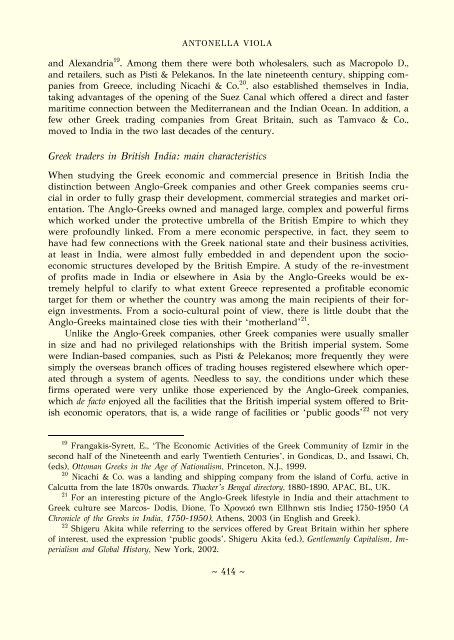You also want an ePaper? Increase the reach of your titles
YUMPU automatically turns print PDFs into web optimized ePapers that Google loves.
ANTONELLA VIOLA<br />
and Alexandria 19 . Among them there were both wholesalers, such as Macropolo D.,<br />
and retailers, such as Pisti & Pelekanos. In the late nineteenth century, shipping companies<br />
from Greece, including Nicachi & Co. 20 , also established themselves in India,<br />
taking advantages of the opening of the Suez Canal which offered a direct and faster<br />
maritime connection between the Mediterranean and the Indian Ocean. In addition, a<br />
few other Greek trading companies from Great Britain, such as Tamvaco & Co.,<br />
moved to India in the two last decades of the century.<br />
Greek traders in British India: main characteristics<br />
When studying the Greek economic and commercial presence in British India the<br />
distinction between Anglo-Greek companies and other Greek companies seems crucial<br />
in order to fully grasp their development, commercial strategies and market orientation.<br />
The Anglo-Greeks owned and managed large, complex and powerful firms<br />
which worked under the protective umbrella of the British Empire to which they<br />
were profoundly linked. From a mere economic perspective, in fact, they seem to<br />
have had few connections with the Greek national state and their business activities,<br />
at least in India, were almost fully embedded in and dependent upon the socioeconomic<br />
structures developed by the British Empire. A study of the re-investment<br />
of profits made in India or elsewhere in Asia by the Anglo-Greeks would be extremely<br />
helpful to clarify to what extent Greece represented a profitable economic<br />
target for them or whether the country was among the main recipients of their foreign<br />
investments. From a socio-cultural point of view, there is little doubt that the<br />
Anglo-Greeks maintained close ties with their ‘motherland’ 21 .<br />
Unlike the Anglo-Greek companies, other Greek companies were usually smaller<br />
in size and had no privileged relationships with the British imperial system. Some<br />
were Indian-based companies, such as Pisti & Pelekanos; more frequently they were<br />
simply the overseas branch offices of trading houses registered elsewhere which operated<br />
through a system of agents. Needless to say, the conditions under which these<br />
firms operated were very unlike those experienced by the Anglo-Greek companies,<br />
which de facto enjoyed all the facilities that the British imperial system offered to British<br />
economic operators, that is, a wide range of facilities or ‘public goods’ 22 not very<br />
19 Frangakis-Syrett, E., ‘The Economic Activities of the Greek Community of Izmir in the<br />
second half of the Nineteenth and early Twentieth Centuries’, in Gondicas, D., and Issawi, Ch,<br />
(eds), Ottoman Greeks in the Age of Nationalism, Princeton, N.J., 1999.<br />
20 Nicachi & Co. was a landing and shipping company from the island of Corfu, active in<br />
Calcutta from the late 1870s onwards. Thacker’s Bengal directory, 1880-1890, APAC, BL, UK.<br />
21 For an interesting picture of the Anglo-Greek lifestyle in India and their attachment to<br />
Greek culture see Marcos- Dodis, Dione, Το Χρονικό twn Ellhnwn stis Indieς 1750-1950 (A<br />
Chronicle of the Greeks in India, 1750-1950), Athens, 2003 (in English and Greek).<br />
22 Shigeru Akita while referring to the services offered by Great Britain within her sphere<br />
of interest, used the expression ‘public goods’. Shigeru Akita (ed.), Gentlemanly Capitalism, Imperialism<br />
and Global History, New York, 2002.<br />
~ 414 ~



